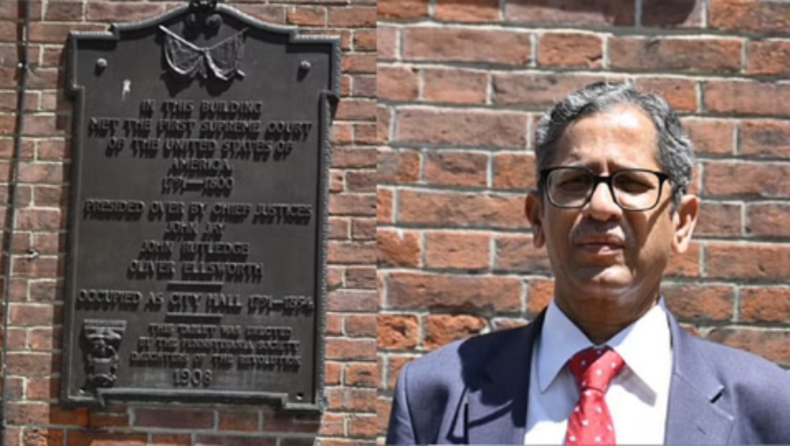The CJI said the monument marks a defining moment in human civilisation and all democracies have been inspired by the values which originated from democracy the sacred place. In 1776, the Second Continental Congress signed the Declaration of Independence at Independence Hall.
Chief Justice N V Ramana has said it is necessary for all the citizens of the world to work tirelessly to sustain and further the liberty, freedom and democracy “our forefathers have fought for”. Ramana made the observation after visiting the Independence Hall in Philadelphia, USA.
Chief Justice N V Ramana has stated that all global citizens must fight diligently to preserve and advance the liberty, freedom, and democracy “for which our ancestors battled.” After touring the Independence Hall in Philadelphia, Ramana made the remark.
According to the CJI, the monument represents a landmark event in human civilization, and all democracies have been influenced by the hallowed site’s principles.
“It represents unequivocal guarantees and assurances of human dignity and existence that are inviolable. Standing in this historic hall, it is impossible not to be impressed by the courage, energy, and ideas that inspired the founding fathers of the United States of America, which continue to reverberate around the world even now.
“We must all, as global citizens, strive diligently to preserve and advance the liberty, freedom, and democracy for which our ancestors battled. That is the only tribute deserving of their efforts,” stated Ramana.
At Independence Hall in 1776, the Second Continental Congress signed the Declaration of Independence.
Although currently known as Independence Hall, the structure was originally designed as the Pennsylvania State House. It previously held all three branches of the colonial government of Pennsylvania.
The CJI also visited the first Supreme Court of the United States, which operated from Philadelphia for almost a decade with six judges. Two days ago, the CJI paid rich respect to one of Columbia University’s most famous alumni, Dr. B R Ambedkar, during a trip to New York. The Dean and Executive Director of the Office of International and Comparative Law Programs, Mr. Adam Kolker, greeted Justice Ramana at Columbia Law School. Justice Ramana placed flowers before the bust of Dr. B. R. Ambedkar located at the University’s Library Building.
At the time, Justice Ramana remarked: “Long years ago, Dr. B. R. Ambedkar walked through the corridors of this great seat of learning. Today, I had the honour of walking in his footsteps. It is an emotional moment for me. I do not have a privileged background. I am son of an ordinary farmer. I am the first in the family to get university education.
Today, I am standing here as the Chief Justice of India. Such a possibility arose because of the most progressive and futuristic Constitution of India that was drafted under the leadership of Dr. B R Ambedkar. I, and millions more like me, will forever remain indebted to the visionary. When the transformational journey of the young republic of India is recorded in history books, credit will be given to the Constitution of India and the people’s faith in it.
It is my honour to be standing here today, in this institution, which has produced many world leaders, including Dr. Ambedkar. He was one of the founders of modern India. His life has inspired generations of Indians to believe in their own worth and identity.
The 75-year long journey of my country so far is a testimony to the power of democracy. It is essential that people, particularly the students and youth, realise the importance of democracy. It is only through your active participation that the democracy can be sustained and strengthened. Only a true democratic order can be the foundation for lasting peace in the world.”













